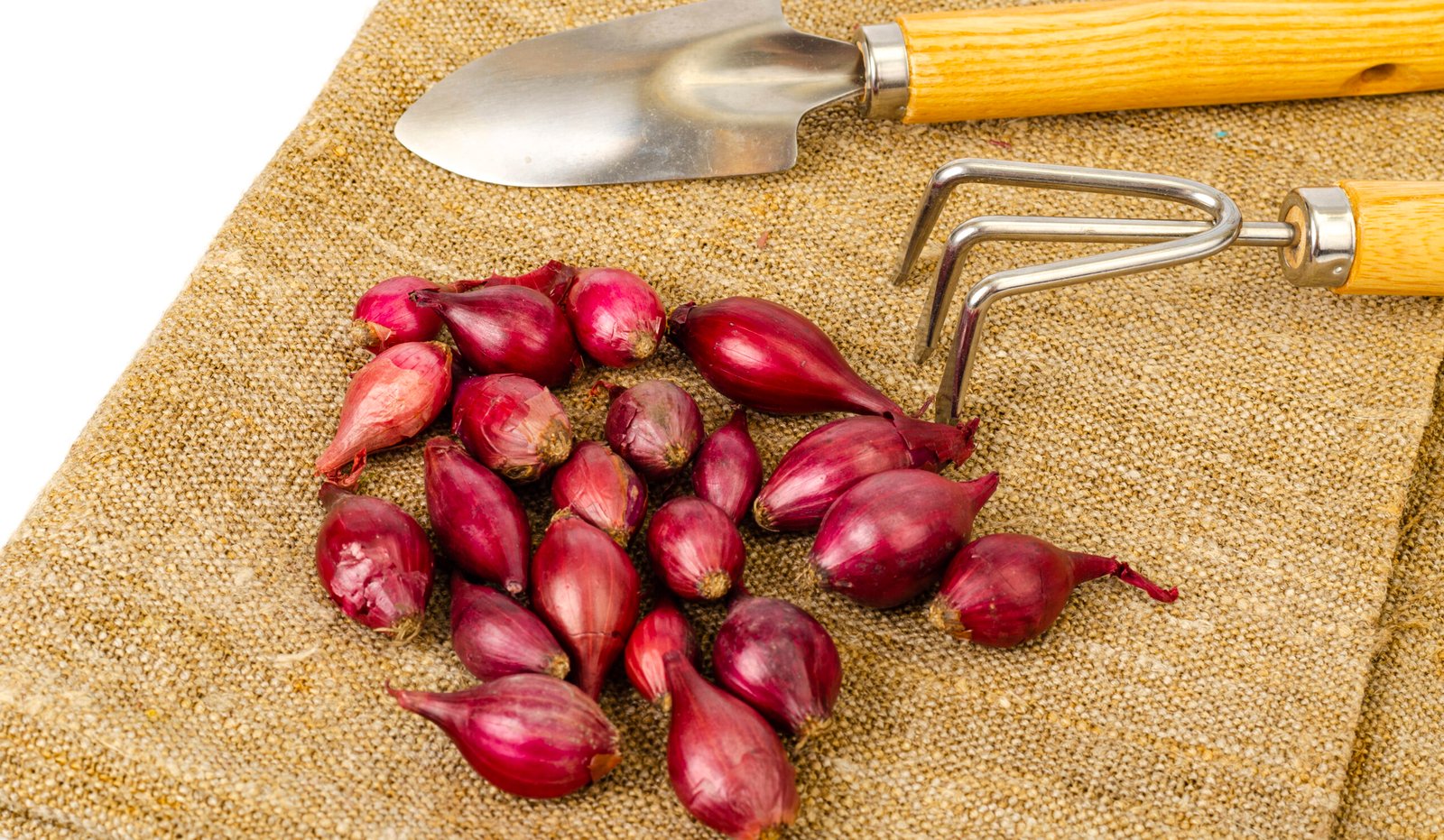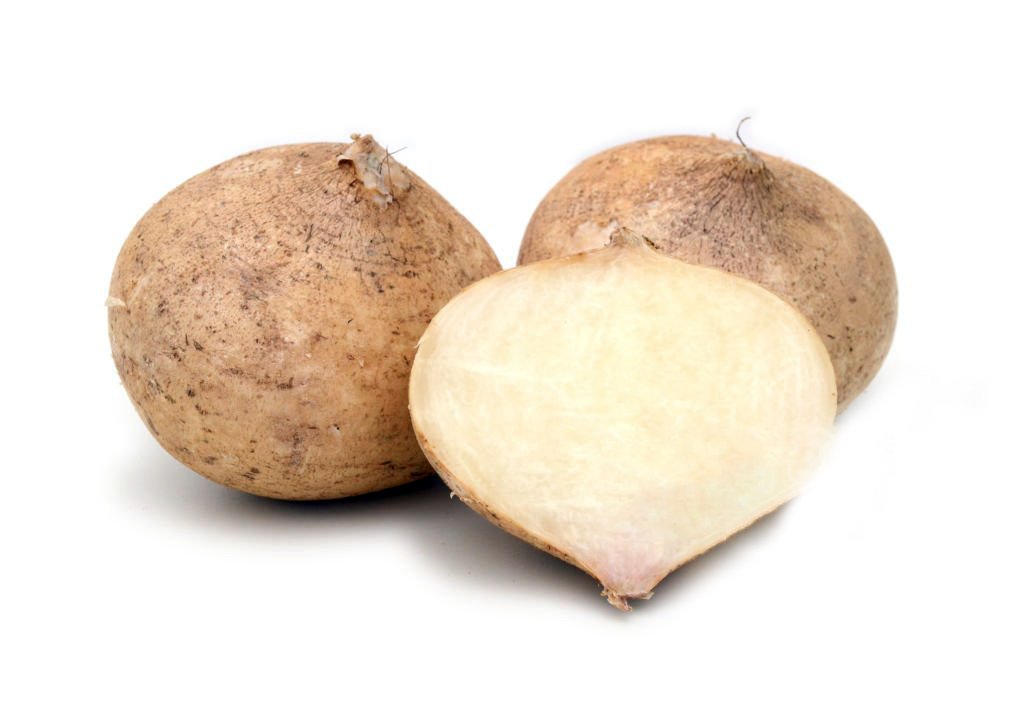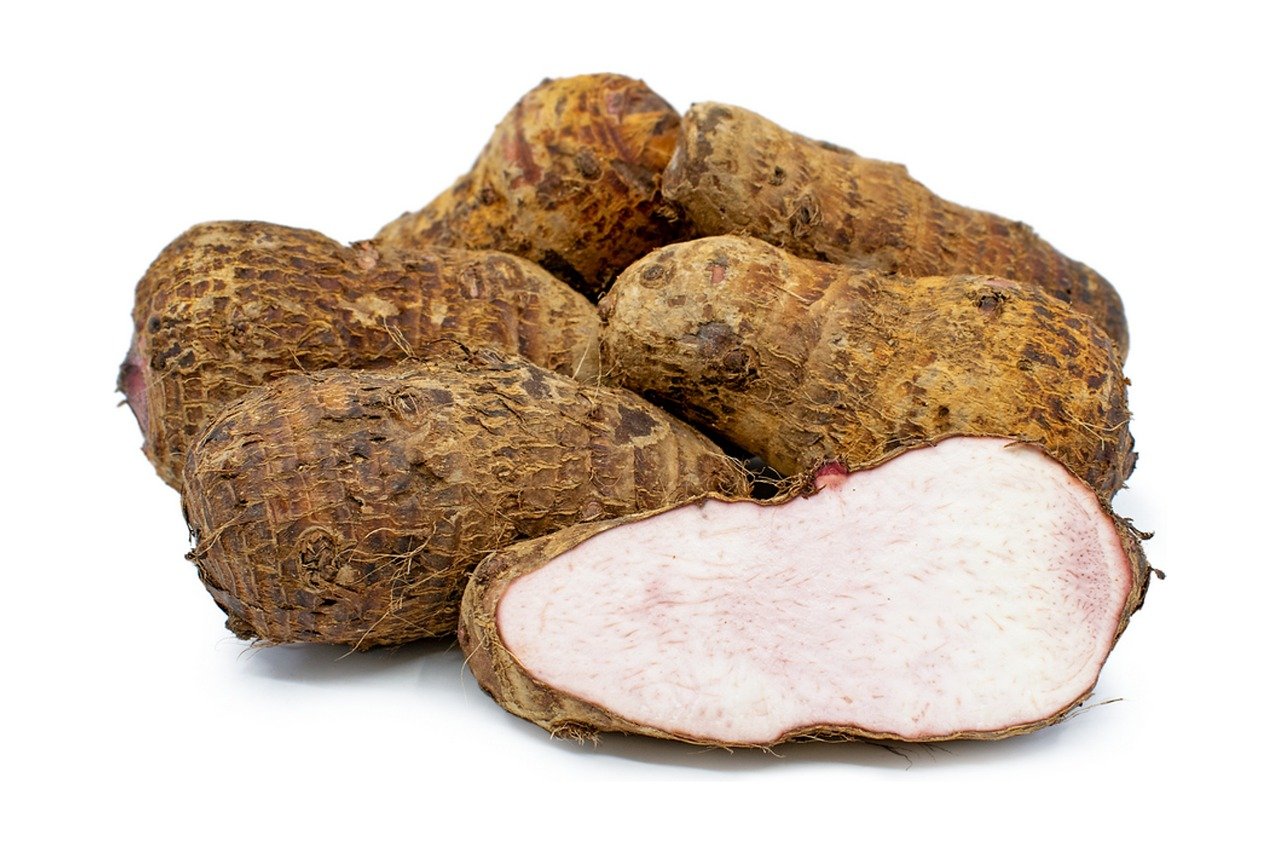
Root vegetables refer to plants that are grown underground and whose roots or tuberous parts are edible. These parts of the plants are typically rich in nutrients and carbohydrates, making them a valuable part of many diets around the world. Root vegetables are known for their ability to store energy in the form of carbohydrates, which is why they often have a sweet taste and starchy texture. Examples of root vegetables include:
The TOP 17 Healthiest Root Vegetables
- Taproots: These are the central, dominant roots from which other roots sprout laterally. Taproots go deep into the soil. Examples include:
Carrots
Parsnips
Beets (Beetroot)
Radishes
Turnips
Daikon
- Tubers: Tubers are enlarged structures in some plant species used to store nutrients. They develop from thickened rhizomes or stolons. Examples include:
Potatoes
Sweet potatoes
Jerusalem artichokes (not to be confused with globe artichokes, which are a type of thistle)
- Bulbs: Bulbs are shoot systems that lie underground. They are made up of layers of fleshy scales (modified leaves) or leaf bases. Examples include:
Onions
Garlic
Shallots
Fennel
- Corms: Corms are short, vertical, swollen underground plant stems that serve as storage organs used by some plants to survive winter or other adverse conditions such as drought. Examples include:
Taro
Water chestnuts
- Rhizomes: Rhizomes are horizontal underground plant stems capable of producing the shoot and root systems of a new plant. Examples include:
Ginger
Turmeric
Galangal
- Tuberous Roots: These are somewhat similar to tubers but are actually enlarged secondary roots. They often store large amounts of starch. Examples include:
Sweet potatoes (often classified as a tuber but technically are tuberous roots)
Cassava (also known as yuca or manioc)
Jicama
Each of these root types serves as an energy storage organ that plants use to survive unfavourable conditions, including winter or dry seasons. In human cuisine, they provide a rich source of carbohydrates, dietary fiber, vitamins, and minerals. Their diverse flavors and textures contribute to a wide range of dishes across various cuisines worldwide.
Root vegetables are versatile in their culinary uses, being suitable for roasting, boiling, mashing, and adding to a variety of dishes for added nutrition and flavor. They are also valued for their storage capacity, with many root vegetables being able to be stored for months under the right conditions, providing a valuable food source throughout the winter months when other fresh produce might be scarce.
Root vegetables are categorized based on the part of the plant that is used for consumption. While the term “root vegetable” is often loosely used to refer to any underground part of a plant, there are specific types of root structures that are commonly eaten. Here are the main types:
1. Carrots

Probably one of the most well-known root vegetables, carrots are rich in beta-carotene, fiber, and several vitamins.
Carrots are a popular and versatile root vegetable known for their vibrant orange color, though they can also come in other colors like purple, yellow, red, and white. They belong to the Apiaceae family, scientifically known as Daucus carota. Carrots are not only delicious but also packed with essential nutrients and offer various health benefits.
Nutritional Value
Carrots are an excellent source of beta-carotene, which the body converts into vitamin A. This nutrient is crucial for maintaining good vision, skin health, and immune function. Besides beta-carotene, carrots contain a variety of other vitamins and minerals, including:
Vitamin K1: Important for blood coagulation and bone health.
Biotin: A B vitamin involved in fat and protein metabolism.
Vitamin B6: Essential for the conversion of food into energy.
Potassium: Important for blood pressure control.
Fiber: The soluble fiber in carrots can help lower blood sugar levels by slowing down the digestion of sugar and starch.
Health Benefits
- Improved Vision: The beta-carotene in carrots is converted into vitamin A in the body, which is vital for eye health. Vitamin A deficiency can lead to night blindness, and a diet rich in beta-carotene can reduce the risk of age related macular degeneration.
- Lower Cholesterol Levels: Eating carrots can help reduce blood cholesterol levels, which decreases the risk of heart disease.
- Weight Loss: As a low calorie food rich in fiber, carrots can help you feel fuller for longer and reduce calorie intake, aiding in weight loss.
- Cancer Prevention: Carrots contain various compounds that have been linked to a reduced risk of certain types of cancer, including lung, prostate, and stomach cancers. The antioxidants in carrots, such as beta-carotene and other carotenoids, can play a role in cancer prevention.
- Skin Health: The vitamin A and antioxidants in carrots can help keep your skin healthy, protect against sun damage, and contribute to healing wounds.
- Boosting Immune Function: Vitamin A plays a crucial role in maintaining a healthy immune system, and the vitamin C and antioxidants in carrots also support immune function.
Incorporating carrots into your diet is easy. They can be eaten raw as a snack or added to salads, soups, stews, and side dishes. Carrots can also be juiced or blended into smoothies for a nutritious drink. Whether cooked or raw, carrots maintain most of their nutritional benefits, making them a valuable addition to a balanced diet.
2. Potatoes

A staple in many diets, potatoes are versatile and rich in potassium, fiber, and vitamin C.
Potatoes are a highly popular and versatile root vegetable consumed all around the world. They belong to the Solanaceae family and are scientifically known as Solanum tuberosum. Despite being associated with high carbohydrate content, potatoes are packed with important nutrients and offer various health benefits when consumed in moderation and as part of a balanced diet.
Nutritional Value
Potatoes are an excellent source of several nutrients, including:
Vitamin C: Potatoes contain vitamin C, which is an antioxidant that helps in the repair of body tissues, aids in the enzymatic production of certain neurotransmitters, is important for immune system function, and assists in the absorption of iron.
Potassium: They are high in potassium, a mineral that helps to regulate fluid balance, muscle contractions, and nerve signals. A diet high in potassium can help reduce blood pressure and may decrease the risk of heart disease and stroke.
Vitamin B6: Potatoes are a good source of vitamin B6, which is involved in energy metabolism by breaking down carbohydrates and proteins into glucose and amino acids.
Fiber: Especially when the skins are left on, potatoes are a good source of dietary fiber, which can improve digestive health and help prevent constipation. Fiber can also help you feel fuller for longer, which might aid in weight management.
Antioxidants: Potatoes also contain a variety of compounds that act as antioxidants, including flavonoids, carotenoids, and phenolic acids. These substances can help prevent damage to your cells from free radicals, potentially reducing the risk of chronic diseases like heart disease and cancer.
Health Benefits
- Heart Health: The potassium in potatoes can help lower blood pressure, while the fiber can help reduce cholesterol levels, both of which are factors that contribute to heart health.
- Digestive Health: The dietary fiber in potatoes, particularly in the skin, helps promote a healthy digestive system by preventing constipation and promoting regular bowel movements.
- Weight Management and Satiety: Potatoes are filling, which can help you feel full longer and potentially reduce overall calorie intake, aiding in weight management. However, preparation methods are crucial—boiled or baked potatoes can be part of a healthy diet, whereas fried potatoes should be consumed in moderation.
- Immune System Support: Vitamin C in potatoes plays a crucial role in immune function, making them a good food choice to support the body’s defense system.
- Improved Physical Performance: The potassium, carbohydrates, and water content of potatoes make them a good choice for maintaining energy levels and hydration during prolonged physical activities.
Potatoes can be a nutritious addition to the diet when prepared in a healthy way. Boiling, baking, and steaming are healthier preparation methods that can preserve the nutritional benefits of potatoes without adding excessive fat or calories. It’s also beneficial to consume potatoes with the skin on whenever possible, as much of the fiber and certain nutrients are located in or just beneath the skin.
3. Beets

(Beetroot) Known for their deep red color, beets are high in folate, fiber, and antioxidants.
Beets, or beetroot, are a vibrant and nutritious root vegetable known for their deep red purple color, earthy flavor, and a host of health benefits. Scientifically referred to as Beta vulgaris, beets are part of the same family as chard and spinach and share many of the same nutritional attributes. They can be consumed raw, cooked, or pickled, and their leaves (beet greens) are also edible and highly nutritious.
Nutritional Value
Beets are low in calories yet high in valuable vitamins and minerals. In particular, they are a good source of:
Folate (Vitamin B9): Essential for DNA synthesis and repair, which contributes to cell health and proper brain function.
Manganese: Important for bone formation, nutrient metabolism, enzyme function, and antioxidant activity.
Potassium: Helps nerves function and muscles contract, and it’s crucial for a healthy heart and blood pressure regulation.
Iron: Necessary for the transport of oxygen in red blood cells.
Vitamin C: An antioxidant that boosts the immune system, skin health, and wound healing.
Nitrates: Naturally occurring compounds in beets that convert to nitric oxide in the body, which can improve blood flow and lower blood pressure.
Health Benefits
- Heart Health and Blood Pressure: The dietary nitrates found in beets are converted to nitric oxide in the body, which helps to relax and dilate blood vessels, improving blood flow and lowering blood pressure, which may reduce the risk of heart disease and stroke.
- Athletic Performance: The nitrates in beets have been shown to enhance athletic performance by improving oxygen use and time to exhaustion. Athletes may benefit from consuming beetroot juice before competitions to improve endurance and performance.
- Inflammation Reduction: Beets contain pigments called betalains, which possess anti-inflammatory properties. Chronic inflammation is associated with several diseases, so consuming anti-inflammatory foods like beets can contribute to overall health.
- Digestive Health: High in fiber, beets support digestive health by preventing constipation and promoting regularity for a healthy digestive tract.
- Brain Health: The nitrates in beets may improve mental and cognitive function by promoting the dilation of blood vessels and thus increasing blood flow to the brain. This is particularly important in aging populations, as mental and cognitive functions often decline with age.
- Cancer Prevention: The antioxidant content and anti-inflammatory properties of beets have led to interest in their potential to prevent cancer, although more research is needed in this area.
Beets can be a colorful and healthy addition to salads, smoothies, and side dishes. When cooking beets, it’s beneficial to keep the skin on to maximize their nutritional content—just give them a good scrub to clean them. Be aware that beets can temporarily color urine and stools a reddish hue, a harmless condition called beeturia. Incorporating beets into your diet can be a tasty way to take advantage of their myriad health benefits.
4. Sweet Potatoes

Similar to potatoes but sweeter and richer in beta-carotene, which the body can convert into vitamin A. Sweet potatoes are a highly nutritious and delicious root vegetable with a rich orange color, though they can also be found in white, purple, and yellow varieties. Scientifically known as Ipomoea batatas, sweet potatoes are not only versatile in culinary uses but also packed with vitamins, minerals, antioxidants, and fiber, offering a plethora of health benefits.
Nutritional Value
Sweet potatoes are an excellent source of:
Beta-carotene: They are exceptionally high in beta-carotene, which the body converts into vitamin A. This nutrient is crucial for maintaining good vision, skin health, and immune function.
Vitamin C: Important for immune system function, skin health, and wound healing.
Potassium: Helps with muscle function, nerve signals, and fluid balance. It also helps to lower blood pressure by counteracting the effects of sodium.
Fiber: Sweet potatoes, especially when eaten with the skin, provide dietary fiber that can help improve digestive health and aid in weight management.
Vitamins B5 and B6: These vitamins are involved in energy metabolism and brain function.
Manganese: A trace mineral that is important for metabolism, bone development, and antioxidant defenses.
Health Benefits
- Improved Vision: The high levels of beta-carotene in sweet potatoes can contribute to maintaining healthy vision and may prevent age related macular degeneration.
- Boosts Immune System: The combination of vitamin A and vitamin C, along with other antioxidants found in sweet potatoes, supports the immune system and helps defend against infections.
- Promotes Gut Health: The fiber and antioxidants in sweet potatoes are beneficial for gut health. The fiber promotes regular bowel movements and feeds the beneficial gut bacteria, while antioxidants protect the digestive tract from damage.
- May Have Cancer Fighting Properties: Some studies suggest that the antioxidants in sweet potatoes, particularly purple sweet potatoes, may reduce the risk of certain types of cancer, including colorectal, breast, and stomach cancers.
- Supports Healthy Blood Pressure: The potassium content in sweet potatoes can help lower blood pressure by maintaining fluid balance and ensuring proper function of the heart and other muscles.
- Anti-inflammatory Properties: Sweet potatoes contain various antioxidants that have been shown to have anti-inflammatory effects, which can reduce the risk of chronic diseases such as heart disease, diabetes, and cancer.
- Supports Weight Management: Due to their fiber content and low glycemic index, sweet potatoes can help regulate blood sugar levels and keep you feeling full longer, aiding in weight management efforts.
Sweet potatoes can be enjoyed in numerous ways, including baked, boiled, roasted, mashed, or incorporated into soups, stews, and salads. They make a healthier alternative to regular potatoes due to their lower glycemic index and higher content of vitamins A and C. Whether as a side dish, part of the main course, or used in desserts, sweet potatoes can contribute significantly to a nutritious and balanced diet.
5. Turnips

Often used in stews and soups, turnips can also be roasted or mashed. They are a good source of vitamin C.
Turnips are root vegetables that belong to the Brassicaceae family, which also includes broccoli, Brussels sprouts, and kale. Known scientifically as Brassica rapa, turnips are grown and consumed worldwide, appreciated for their versatility in cooking and their nutritional benefits. They have a mild, slightly peppery flavor that can complement a variety of dishes, from soups and stews to salads and side dishes. The entire plant is edible, with the roots typically being white or purple skinned and the greens being highly nutritious as well.
Nutritional Value
Turnips are low in calories but high in vitamins and minerals. They provide:
Vitamin C: A powerful antioxidant that helps with the repair of tissues, boosts the immune system, and aids in iron absorption.
Fiber: Important for digestive health, maintaining a healthy weight, and preventing chronic diseases.
Vitamin K: Crucial for blood clotting and bone health.
Folate (Vitamin B9): Essential for cell function and tissue growth, making it particularly important for pregnant women to prevent neural tube defects.
Calcium: Important for bone health and necessary for proper function of the heart, muscles, and nerves.
Potassium: Helps to regulate blood pressure by counteracting the effects of sodium and has other important functions in the body.
Health Benefits
- Improved Digestive Health: The fiber content in turnips can help prevent constipation and promote a healthy digestive tract.
- Weight Management: Low in calories and high in fiber, turnips can help you feel fuller for longer, making them a great addition to a weight loss or maintenance diet.
- Heart Health: Turnips contain various nutrients that contribute to heart health. The potassium content helps to reduce blood pressure, while fiber can lower cholesterol levels. Additionally, the presence of antioxidants may reduce the risk of heart disease.
- Stronger Bones: The calcium and vitamin K found in turnips are vital for maintaining strong, healthy bones and reducing the risk of osteoporosis.
- Boosted Immune Function: With a good amount of vitamin C, turnips can help boost the immune system and increase resistance to infections, colds, and flu.
- Reduced Cancer Risk: Like other vegetables in the Brassicaceae family, turnips contain glucosinolates, compounds that may have anticancer properties. Research suggests that these compounds can help reduce the risk of certain types of cancer by promoting the elimination of carcinogens and inhibiting the growth of cancer cells.
Turnips are a versatile vegetable that can be enjoyed in many ways. They can be roasted, boiled, steamed, mashed, or eaten raw in salads. Their leaves, known as turnip greens, are also highly nutritious and can be cooked similarly to spinach or kale. Incorporating turnips into your diet can provide a variety of health benefits and contribute to overall wellbeing.
6. Radishes

Typically eaten raw in salads, they have a peppery flavor and are rich in antioxidants.
Radishes are a crisp, peppery vegetable that belongs to the Brassicaceae family, the same family as broccoli, kale, and cabbage. Known scientifically as Raphanus sativus, radishes come in several varieties, sizes, and colors, including red, white, purple, and black. They are commonly eaten raw in salads but can also be cooked or pickled. Beyond their culinary versatility, radishes offer a range of health benefits due to their rich nutrient profile.
Nutritional Value
Radishes are low in calories but high in several nutrients:
Vitamin C: Provides antioxidant protection, boosts the immune system, aids in skin health and wound healing, and enhances iron absorption.
Folate (Vitamin B9): Important for cell function and tissue growth, and is especially important for pregnant women to prevent neural tube defects.
Potassium: Helps regulate fluid balance, muscle contractions, and nerve signals. It can also help lower blood pressure by counteracting the effects of sodium.
Fiber: Essential for digestive health, it helps prevent constipation and may aid in weight management.
Calcium, magnesium, and phosphorus: These minerals are important for bone health.
Health Benefits
- Digestive Health: The fiber in radishes helps promote regular bowel movements and can prevent constipation, contributing to a healthy digestive system.
- Weight Management: Radishes are low in calories and high in water and fiber, which can help you feel full and satisfied, making them a great addition to a weight loss or maintenance diet.
- Cardiovascular Health: The potassium in radishes can help manage blood pressure, and the antioxidant properties may help protect against blood vessel damage. Additionally, radishes contain compounds that can improve the body’s lipid profile.
- Immune System Support: High in vitamin C, radishes can help strengthen the immune system and increase resistance to infectious agents.
- Anticancer Properties: Like other cruciferous vegetables, radishes contain compounds that may possess anticancer properties. Glucosinolates, which give radishes their peppery taste, can help detoxify and eliminate cancer causing substances and inhibit tumor growth.
- Skin Health: The vitamin C and antioxidants in radishes can help prevent skin damage caused by UV rays, pollution, and aging, contributing to healthier, more resilient skin.
Radishes can be easily incorporated into your diet in various ways—raw in salads or as a garnish, cooked in dishes, or fermented in pickles. Their unique flavor and crunch add a refreshing element to meals, while their nutritional profile contributes to overall health and wellbeing.
7. Parsnips

Similar in shape to carrots but paler, parsnips have a sweet, nutty flavor and are often used in soups and stews.
Parsnips are a root vegetable closely related to carrots and parsley. They have a sweet, nutty flavor and are typically white or cream-colored. Parsnips (Pastinaca sativa) have been cultivated for thousands of years and were a staple in the diet before the potato became popular in Europe. They are versatile in the kitchen and can be roasted, boiled, mashed, or used in soups and stews. Beyond their culinary uses, parsnips offer a variety of health benefits due to their rich nutritional profile.
Nutritional Value
Parsnips are an excellent source of several important nutrients:
Fiber: They are high in dietary fiber, which is beneficial for digestive health and can help prevent constipation and reduce blood cholesterol levels.
Vitamin C: This vitamin is important for the immune system, skin health, and wound healing.
Folate (Vitamin B9): Essential for cell function and tissue growth, folate is particularly important during periods of rapid growth such as pregnancy.
Vitamin K: Necessary for blood clotting and bone health.
Potassium: This mineral helps regulate blood pressure, reducing the risk of heart disease.
Antioxidants: Parsnips contain antioxidants such as vitamin C, vitamin E, and flavonoids, which help protect the body from damage caused by free radicals.
Health Benefits
- Improved Digestive Health: The high fiber content in parsnips can help maintain a healthy digestive system by promoting regular bowel movements and preventing constipation.
- Heart Health: The fiber in parsnips also plays a role in heart health by helping to lower high cholesterol levels. Moreover, the potassium content helps to manage blood pressure.
- Weight Management: High in fiber and low in calories, parsnips can help you feel fuller for longer, making them a great addition to a weight management diet.
- Boosted Immune Function: With a good amount of vitamin C, parsnips support the immune system and can help increase your body’s resistance to infectious agents.
- Reduced Risk of Chronic Diseases: The antioxidants in parsnips, such as vitamin C, vitamin E, and flavonoids, may help reduce the risk of chronic diseases by combating oxidative stress and inflammation.
- Bone Health: Vitamin K in parsnips contributes to bone health by improving calcium absorption and reducing urinary excretion of calcium, thereby helping to prevent osteoporosis.
Parsnips can be enjoyed in a variety of ways and are a nutritious addition to many dishes. Their sweet, slightly spicy flavor makes them a versatile ingredient that can enhance the taste and nutritional value of your meals. Whether roasted to bring out their natural sweetness, added to soups and stews for depth of flavor, or mashed for a creamy side dish, parsnips are a delightful and healthful choice for any diet.
8. Ginger

A spicy and aromatic root, ginger is often used in cooking and for medicinal purposes. It’s known for its anti-inflammatory properties.
Ginger is a flowering plant native to Southeast Asia, scientifically known as Zingiber officinale. It has a long history of use in various culinary traditions and traditional medicine systems around the world. The rhizome, or underground stem, of the ginger plant is most commonly used, either fresh, dried, or powdered, to add flavor and aroma to dishes or as a natural remedy for various ailments. Ginger is known for its unique spicy, pungent taste and its numerous health benefits.
Nutritional Value
Ginger contains several bioactive compounds and nutrients, including:
Gingerol: This compound is responsible for much of the medicinal properties of ginger, including its anti-inflammatory and antioxidant effects.
Gingerol: Another compound found in ginger, which has similar properties to gingerol and contributes to its health benefits.
Vitamin C: An antioxidant that supports immune function and skin health.
Magnesium: Important for nerve function, muscle contraction, and bone health.
Potassium: Helps regulate blood pressure and fluid balance.
Fiber: Supports digestive health and promotes feelings of fullness.
Health Benefits
- Anti-inflammatory Properties: Ginger contains potent anti-inflammatory compounds, which can help reduce inflammation and pain associated with conditions such as arthritis, osteoarthritis, and muscle soreness.
- Digestive Health: Ginger has long been used as a remedy for various digestive issues, including nausea, indigestion, and motion sickness. It can help alleviate symptoms of nausea and vomiting, including morning sickness during pregnancy and chemotherapy induced nausea.
- Relief from Menstrual Discomfort: Ginger has been shown to help reduce the severity of menstrual cramps in some studies, possibly due to its anti-inflammatory effects and ability to relax muscles.
- Immune System Support: The antioxidant properties of ginger, along with its vitamin C content, can help support a healthy immune system and protect against infections.
- Nausea Relief: Ginger is well-known for its ability to alleviate nausea and vomiting, whether caused by motion sickness, pregnancy, chemotherapy, or post surgery recovery.
- Blood Sugar Regulation: Some research suggests that ginger may help improve insulin sensitivity and reduce blood sugar levels, potentially benefiting individuals with diabetes or those at risk of developing the condition.
- Heart Health: Ginger may help lower cholesterol levels and improve blood circulation, reducing the risk of heart disease and stroke.
- Brain Health: Preliminary studies suggest that ginger may have neuroprotective effects and could potentially help improve cognitive function and reduce the risk of neurodegenerative diseases like Alzheimer’s.
Ginger can be consumed fresh, dried, powdered, or as a juice or oil. It can be added to a variety of dishes, including soups, stir fries, teas, and baked goods, to impart flavor and reap its health benefits. Additionally, ginger supplements are available in various forms, including capsules, extracts, and tinctures, for those looking to incorporate ginger into their daily routine in a convenient way. However, it’s essential to consult with a healthcare professional before using ginger supplements, especially if you have any underlying health conditions or are taking medications.
9. Garlic

While often classified as a herb, the part of garlic that is most commonly used is the bulb (a root structure). Garlic is well known for its flavor and health benefits.
Garlic (Allium sativum) is a popular ingredient in cooking due to its strong flavor, but it has also been used for its medicinal properties for centuries. The health benefits of garlic are attributed to its rich array of vitamins, minerals, antioxidants, and bioactive compounds.
Nutritional Value
Garlic is low in calories and rich in vitamin C, vitamin B6, and manganese. It also contains trace amounts of various other nutrients. The primary active compound in garlic is allicin, which is formed when garlic is chopped, crushed, or chewed. This compound is responsible for most of garlic’s health benefits, along with other sulfurcontaining compounds like diallyl disulfide.
Health Benefits
- Immune System Support: Garlic has been shown to boost the function of the immune system. Studies have found that it can reduce the frequency and duration of colds and other infections.
- Heart Health: Garlic has beneficial effects on heart health. It has been shown to lower high blood pressure and cholesterol levels, which are significant risk factors for heart disease. Additionally, garlic can improve arterial health by reducing arterial stiffness.
- Antioxidant Properties: Garlic contains antioxidants that protect against cell damage and aging. These antioxidants may help reduce the risk of Alzheimer’s disease and dementia by combating oxidative damage from free radicals.
- Detoxification: High doses of garlic have been shown to protect against organ damage from heavy metal toxicity. Garlic reduces blood lead levels, partly by reducing the clinical signs of toxicity.
- Bone Health: Garlic may have beneficial effects on bone health by increasing estrogen levels in females, which can help minimize bone loss. This suggests a potential role in the management of osteoporosis and arthritis.
- AntiCancer Properties: Research indicates that garlic consumption may have a protective effect against certain types of cancer, such as stomach and colorectal cancers. This is believed to be due to garlic’s ability to reduce the formation of cancercausing substances, enhance DNA repair, and induce cell death in cancer cells.
- AntiMicrobial Effects: Garlic has been used to treat bacterial, fungal, and parasitic infections for centuries. Its antimicrobial effects are attributed to allicin and other sulfurcontaining compounds.
- Blood Sugar Regulation: Some studies suggest that garlic can help regulate blood sugar levels by increasing insulin sensitivity, which may be beneficial for people with diabetes or at risk of developing diabetes.
Garlic can be consumed in various forms, including raw, cooked, or aged garlic supplements. While garlic is a healthy addition to your diet, it’s worth noting that excessive consumption can lead to side effects, such as bad breath, indigestion, or increased bleeding risk in sensitive individuals. It’s also advisable to consult with a healthcare professional before taking garlic supplements, especially if you are on bloodthinning medication or have a scheduled surgery, due to its potential antiplatelet properties.
10. Onions

Another root structure that is commonly used for its flavoring properties in a wide variety of dishes around the world.
Onions (Allium cepa) are a staple ingredient in many cuisines worldwide, appreciated for their flavor and the depth they add to a wide variety of dishes. Beyond their culinary uses, onions have been used for medicinal purposes for centuries, attributed to their potent bioactive compounds. These include various vitamins, minerals, and antioxidants, which contribute to a range of health benefits.
Nutritional Value
Onions are low in calories yet rich in nutrients, including:
Vitamin C: An antioxidant that assists in immune function, collagen production, tissue repair, and iron absorption.
Vitamin B6 (pyridoxine): Plays a crucial role in metabolism, brain development during pregnancy and infancy, and immune function.
Folate (Vitamin B9): Essential for cell function and tissue growth, and is particularly important for pregnant women to help prevent neural tube defects.
Potassium: An essential mineral that helps regulate fluid balance, muscle contractions, and nerve signals.
Onions also contain small amounts of calcium, iron, phosphorus, magnesium, and antioxidants, including flavonoids and sulfur compounds, which are responsible for many of their health benefits.
Health Benefits
- Heart Health: Onions are rich in antioxidants and compounds that fight inflammation, decrease triglycerides, and reduce cholesterol levels — all of which may lower heart disease risk. Their potent anti-inflammatory properties may also help reduce high blood pressure and protect against blood clots.
- Cancer Prevention: Consuming allium vegetables like onions has been linked to a reduced risk of certain cancers, including stomach and colorectal cancers. This effect is thought to be due to onions’ rich content of antioxidants and sulfur compounds, which have been shown to inhibit tumor growth in animal studies and potentially in humans.
- Blood Sugar Regulation: Onions may help control blood sugar, which is especially significant for people with diabetes or prediabetes. This effect is believed to be due to sulfur compounds and quercetin, an antioxidant flavonoid found in onions.
- Bone Density: Some studies suggest that onions may boost bone density and reduce oxidative stress, which can benefit older women or those at risk of osteoporosis.
- Anti-inflammatory and Antioxidant Properties: Onions are high in antioxidants, including quercetin, which can combat inflammation and reduce markers of oxidative stress. This has implications for reducing the risk of chronic diseases like heart disease, diabetes, and cancer.
- Digestive Health: Onions are a source of fiber and prebiotics, which are necessary for optimal gut health. Inulin, a type of soluble fiber found in onions, helps maintain a healthy gut flora, improving digestion and contributing to a healthy immune system.
- Antimicrobial Properties: Onions have been shown to fight bacteria, including E. coli and Staphylococcus aureus. Some studies suggest that onion extracts may inhibit the growth of these bacteria, highlighting the potential for onions to contribute to food safety and preservation.
Including onions in your diet can be a tasty and healthful choice. They can be consumed in various ways: raw in salads, cooked in soups, stews, and other dishes, or even pickled. While they are generally safe and beneficial for most people, onions can cause problems for individuals with irritable bowel syndrome (IBS) or those who are allergic to them, leading to symptoms like bloating, gas, and cramps.
11. Shallots

Nutritional Value Shallots are low in calories but high in vitamins and minerals, including:
Vitamin A: Important for vision, the immune system, and skin health.
Vitamin C: An antioxidant that is essential for immune function, collagen production, and iron absorption.
Folate (Vitamin B9): Necessary for cell function and tissue growth, and particularly important for pregnant women to help prevent neural tube defects.
Potassium: An essential mineral that helps regulate fluid balance, muscle contractions, and nerve signals.
They also contain antioxidants and compounds such as flavonoids and sulfurcontaining compounds (similar to those found in garlic and onions), which contribute to their healthpromoting properties.
Health Benefits
- Heart Health: The antioxidants in shallots, especially flavonoids like quercetin, can help reduce heart disease risk by fighting inflammation, lowering blood pressure, and reducing cholesterol levels.
- Anti-inflammatory Properties: Shallots contain sulfur compounds that have anti-inflammatory effects. These properties can help reduce inflammation in the body, potentially lowering the risk of chronic diseases such as heart disease, diabetes, and cancer.
- Antioxidant Effects: Shallots are rich in antioxidants, which help neutralize harmful free radicals in the body. This can prevent oxidative stress and may reduce the risk of chronic diseases, including certain cancers.
- Supports Digestive Health: Like other members of the Allium family, shallots are a good source of prebiotics, which feed beneficial gut bacteria. A healthy gut micro biota is crucial for overall health, including efficient digestion and a strong immune system.
- Bone Health: Some research suggests that compounds found in shallots and other Allium vegetables might have beneficial effects on bone health by increasing bone density and reducing the risk of osteoporosis, especially in postmenopausal women.
- Antimicrobial Properties: Shallots have been shown to possess antimicrobial properties that may help fight against certain strains of bacteria, viruses, and fungi, contributing to overall health and potentially reducing the risk of some infections.
Including shallots in your diet is an excellent way to enhance the flavor of your meals while also benefiting from their various health properties. They can be used similarly to onions but are particularly wellsuited to dishes where a more subtle, refined flavor is desired. Whether eaten raw in salads, pickled, or cooked in sauces, soups, and stews, shallots are a versatile ingredient that can contribute to a healthy and balanced diet.
12. Fennel

Nutritional Value
Fennel is low in calories but high in important nutrients, including:
Vitamin C: An essential nutrient and antioxidant that supports immune health, skin health, and iron absorption.
Fiber: Promotes digestive health, helps prevent constipation, and may aid in weight management by providing a feeling of fullness.
Potassium: Vital for heart health, muscle function, and nerve signaling.
Manganese: A trace element that plays a role in bone health and metabolism.
Calcium: Essential for bone health and proper function of the heart, muscles, and nerves.
Iron: Necessary for the formation of healthy red blood cells and transportation of oxygen throughout the body.
Health Benefits
- Digestive Health: Fennel is known for its ability to promote digestive health. It can help relax the muscles in the gastrointestinal tract, reducing gas, bloating, and stomach cramps. Fennel seeds, in particular, have been used traditionally as a digestive aid and to alleviate symptoms of indigestion.
- Antioxidant Properties: Fennel contains several antioxidants, such as anethole, limonene, quercetin, and rutin, which help neutralize harmful free radicals in the body. This can reduce oxidative stress and lower the risk of chronic diseases.
- Anti-inflammatory Effects: The antioxidants in fennel also contribute to its anti-inflammatory properties. Chronic inflammation is linked to many diseases, so incorporating anti-inflammatory foods like fennel into your diet can be beneficial for overall health.
- Bone Health: Fennel provides nutrients important for bone health, including calcium, magnesium, and vitamin K. Regular consumption of fennel could help maintain strong bones and prevent osteoporosis.
- Blood Pressure Management: The high potassium content in fennel makes it beneficial for maintaining healthy blood pressure levels. Potassium acts as a vasodilator, helping to relax the blood vessels and reduce the risk of high blood pressure.
- Immune System Support: With its high vitamin C content, fennel can support the immune system. Vitamin C stimulates the production of white blood cells, which are crucial for fighting infections and diseases.
- Weight Management: Fennel’s high fiber content can also aid in weight management by providing a feeling of fullness, which may help reduce overall calorie intake.
Fennel can be enjoyed raw in salads, braised or roasted as a side dish, or used as a seasoning with its seeds. Its versatility and unique flavor, along with the health benefits it offers, make it a valuable addition to a balanced and nutritious diet.
13. Water chestnuts

Water chestnuts (Eleocharis dulcis) are not true nuts but rather a type of aquatic vegetable primarily grown in India, and other parts of Southeast Asia. They are highly regarded for their crisp texture and sweet, nutty flavor, making them a popular ingredient in Asian cuisine. Water chestnuts can be eaten raw or cooked and are often added to dishes like stirfries, salads, and soups.
Nutritional Value
Water chestnuts are low in calories yet rich in several nutrients, including:
Fiber: Important for digestive health and can help prevent constipation and maintain a healthy weight.
Potassium: Essential for maintaining healthy blood pressure and proper heart function.
Vitamin B6: Plays a vital role in metabolism, brain health, and immune function.
Riboflavin (Vitamin B2): Necessary for energy production, cell function, and skin health.
Copper: Important for blood cell formation and nerve health.
Manganese: A trace mineral essential for metabolism, bone formation, and antioxidant defense.
Health Benefits
- Digestive Health: The high fiber content in water chestnuts can help promote regularity and digestive health by adding bulk to the stool and supporting healthy gut bacteria.
- Weight Management: Low in calories and high in water content, water chestnuts can contribute to a feeling of fullness, making them a great addition to weight loss diets. Their crunchy texture and sweet flavor also make them a satisfying snack.
- Heart Health: The potassium in water chestnuts can help regulate blood pressure, while the fiber can lower cholesterol levels, both of which support heart health.
- Antioxidant Properties: Water chestnuts contain antioxidants, such as ferulic acid, which help protect the body from oxidative stress and reduce the risk of chronic diseases.
- Blood Sugar Control: Despite their sweetness, water chestnuts have a relatively low glycemic index (GI), meaning they cause a slower rise in blood sugar levels, which is beneficial for blood sugar management.
- Supports Immune Function: The various vitamins and minerals in water chestnuts, including vitamin B6 and copper, play a role in supporting the immune system, helping the body resist infections and diseases.
Water chestnuts can be a versatile and healthful addition to the diet. They are available fresh, canned, or packaged in most Asian markets and some supermarkets. Fresh water chestnuts have the best taste and texture but require peeling before use. Canned or packaged varieties are convenient but may contain added sugars or preservatives, so it’s advisable to check the label before purchasing. Whether added to savory dishes or enjoyed as a crunchy snack, water chestnuts offer a delightful combination of taste and nutrition benefits.
14. Galangal

Galangal (Alpinia galanga) is a rhizome belonging to the ginger family and is closely related to ginger and turmeric. It is native to Southeast Asia and is a staple in many Asian cuisines, particularly Thai, Indonesian, and Malaysian dishes. Galangal is valued not only for its culinary uses, where it imparts a sharp, spicy flavor to soups, curries, and marinades, but also for its medicinal properties. It has been used in traditional medicine for centuries to treat various ailments.
Nutritional Value
While specific nutritional data on galangal is limited, it is known to contain a range of compounds that contribute to its health benefits. These include:
Essential oils: Such as galangin, eugenol, and gingerol, which have anti-inflammatory and antimicrobial properties.
Flavonoids: Antioxidants that help protect the body against oxidative stress.
Phenolic compounds: Which have antioxidant properties.
Health Benefits
- Digestive Health: Galangal has been used traditionally to help with digestion and to relieve stomach discomfort. It is believed to stimulate appetite and assist in soothing the digestive tract, reducing symptoms such as nausea, bloating, and stomach cramps.
- Anti-inflammatory Properties: The compounds in galangal, like gingerol, have anti-inflammatory effects. These properties can help reduce pain and inflammation in conditions like arthritis, as well as relieve muscle discomfort.
- Antimicrobial Effects: Galangal contains substances that have been shown to fight a variety of pathogenic bacteria and fungi. This makes it potentially useful in preventing and treating infections.
- Antioxidant Benefits: The presence of flavonoids and phenolic compounds means galangal can help neutralize harmful free radicals in the body, reducing oxidative stress and lowering the risk of chronic diseases, including certain types of cancer.
- Supports Cardiovascular Health: Some studies suggest that galangal may help improve heart health by reducing blood pressure and cholesterol levels, although more research is needed in this area.
- Potential Anti Cancer Properties: Early research indicates that galangal may have anticancer properties, particularly against certain types of cancer cells. Compounds like galangin can inhibit the growth of tumors and induce apoptosis (cell death) in cancer cells.
Galangal can be used fresh, dried, or powdered, but the fresh root typically offers the most flavor and health benefits. It’s worth noting that while galangal offers potential health benefits, more research, especially human studies, is needed to fully understand its effects and medicinal properties. As with any supplement or herbal remedy, it’s a good idea to consult with a healthcare provider before adding galangal to your health regimen, especially if you have existing health conditions or are taking medications.
15. Jicama

Nutritional Value
Jicama is low in calories but rich in a variety of nutrients, making it a healthy addition to any diet. Its notable nutritional highlights include:
High in Fiber: Jicama is an excellent source of dietary fiber, particularly inulin, which is a prebiotic fiber that aids digestive health.
Vitamin C: It provides a significant amount of Vitamin C, essential for immune function, skin health, and antioxidant protection.
Potassium: Contains potassium, important for maintaining healthy blood pressure levels and proper cellular function.
Iron: Offers a modest amount of iron, necessary for oxygen transport in the blood.
Magnesium: Contains magnesium, which is vital for many body processes, including muscle and nerve function, blood glucose control, and bone health.
Health Benefits
- Digestive Health: The high fiber content in jicama can help improve digestive health by promoting regular bowel movements and feeding beneficial gut bacteria.
- Weight Management: Jicama is low in calories yet high in water and fiber, making it filling and satisfying without contributing to weight gain. It can be a great snack for those looking to manage their weight.
- Boosts Immune System: With its high vitamin C content, jicama can help strengthen the immune system and may reduce the duration of colds.
- Promotes Heart Health: The fiber, potassium, and antioxidants in jicama can contribute to cardiovascular health by lowering blood pressure, improving lipid profiles, and reducing inflammation.
- Antioxidant Protection: Jicama contains antioxidants, including vitamin C and other compounds that can help protect the body against oxidative stress and reduce the risk of chronic diseases.
- Blood Sugar Control: The inulin in jicama is a type of soluble fiber that can help regulate blood sugar levels, making it a good choice for people with diabetes or those at risk of developing the condition.
Jicama can be a versatile and nutritious addition to the diet. Its unique texture and flavor make it suitable for a variety of dishes, both raw and cooked. When selecting jicama at the store, look for firm, dry roots with no signs of mold or soft spots. Before eating, the skin should be peeled as it is inedible. Whether served in a crunchy salad, as a vehicle for dips, or cooked in savory dishes, jicama offers numerous health benefits alongside its pleasant taste.
16. Taro

Taro (Colocasia esculenta) is a starchy root vegetable originally from Southeast Asia and India but now cultivated and enjoyed worldwide, especially in Africa, China, the Caribbean, and the Pacific Islands. It’s known for its large, elephant earlike leaves and its corms, which are the edible part of the plant. Taro has a nutty flavor that some compare to a sweeter version of a potato. It is a staple food in many cultures and is used in a variety of dishes, ranging from soups and stews to desserts and snacks.
Nutritional Value
Taro is nutritionally dense, providing a good source of:
Fiber: Essential for digestive health, helping to prevent constipation and promoting a feeling of fullness.
Vitamins: It is rich in various vitamins, especially vitamin E and vitamin C, which are powerful antioxidants important for immune function, skin health, and preventing oxidative stress.
Minerals: Taro provides significant amounts of potassium, magnesium, and iron. Potassium helps to manage blood pressure, magnesium supports muscle and nerve function, and iron is crucial for creating red blood cells.
Complex Carbohydrates: It contains complex carbohydrates that provide a steady release of energy, making it a great food for sustained energy levels.
Health Benefits
- Digestive Health: The high level of dietary fiber in taro root can help improve digestive health by reducing constipation and improving the overall health of the gut.
- Heart Health: Taro’s fiber content also contributes to heart health by helping to lower cholesterol levels. Potassium in taro can help to regulate blood pressure, further benefiting the cardiovascular system.
- Antioxidant Properties: The presence of vitamin C, vitamin E, and other antioxidants in taro helps to combat oxidative stress and may reduce the risk of chronic diseases such as heart disease and cancer.
- Blood Sugar Regulation: Despite its sweetness, taro has a low to medium glycemic index (GI), meaning it causes a slower rise in blood sugar levels. This, along with its fiber content, makes it beneficial for blood sugar management.
- Weight Management: Taro is relatively low in calories but high in fiber, making it a filling food that can help control appetite and support weight management efforts.
- Boosts Immunity: The vitamins and minerals in taro, such as vitamin C, play an essential role in supporting the immune system, helping the body to fight off infections and diseases.
It’s important to note that taro should never be eaten raw due to its content of calcium oxalate, which can lead to kidney stones and other health issues. Cooking taro thoroughly neutralizes these compounds, making it safe to eat. Taro can be boiled, steamed, baked, or fried and is a versatile ingredient that can be used in both savory and sweet dishes. Whether mashed, made into chips, or used in a traditional dish like poi in Hawaiian cuisine, taro offers a nutritious and delicious way to diversify your diet.
17. Cassava

Cassava (Manihot esculenta) is a tropical root vegetable that is a staple food in many parts of the world, including Africa, Latin America, and Asia. It’s known for its versatility and ability to grow in harsh conditions where other crops may not thrive. Cassava roots can be processed in various ways to produce different food products, including flour, tapioca pearls, and cassava chips. It’s important to note that cassava must be properly prepared before consumption, as it contains cyanogenic glycosides, which can release cyanide when eaten raw or improperly processed.
Nutritional Value
Cassava is a significant source of carbohydrates, making it an excellent energy source. It also contains some key vitamins and minerals, such as:
Vitamin C: An antioxidant that supports immune function and skin health.
Folate (Vitamin B9): Important for cell function and tissue growth, making it especially important for pregnant women to prevent neural tube defects.
Magnesium: Essential for muscle and nerve function, blood glucose control, and bone health.
Potassium: Helps regulate blood pressure and is important for proper cell function.
Fiber: Cassava contains some dietary fiber, which is beneficial for digestive health.
Health Benefits
- Energy Provision: Due to its high carbohydrate content, cassava can provide a quick source of energy, making it a valuable food item in diets, especially in regions where food insecurity is a concern.
- Gluten Free: Cassava flour is naturally gluten free, making it an excellent alternative for people with gluten intolerance or celiac disease when looking for flour alternatives for baking and cooking.
- Supports Digestive Health: The fiber in cassava can help support healthy digestion by preventing constipation and promoting a healthy gut micro biome.
- May Support Heart Health: While cassava is high in carbohydrates, its fiber content, potassium, and folate can contribute to cardiovascular health by helping to lower blood pressure, reduce cholesterol levels, and support overall heart function.
- Antioxidant Properties: Cassava contains vitamin C and other antioxidants that can help protect the body from oxidative stress and may reduce the risk of chronic diseases.
Despite these benefits, it’s crucial to consume cassava in moderation as part of a balanced diet. Its high carbohydrate and calorie content can contribute to weight gain if consumed in large amounts without adequate physical activity. Additionally, ensure cassava is prepared correctly to remove toxic compounds and prevent potential health risks.
Cassava can be a nutritious addition to the diet when prepared and consumed properly. Its versatility in cooking and baking as a gluten free alternative adds to its appeal in diverse culinary practices worldwide.
